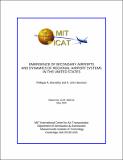Emergence of Secondary Airports and Dynamics of Regional Airport Systems in the United States
Author(s)
Bonnefoy, Philippe A; Hansman, R. John
DownloadBonnefoy.pdf (5.073Mb)
Metadata
Show full item recordAbstract
With the growing demand for air transportation and limited capacity at major airports, there is a need to increase the capacity of airport systems at the metropolitan area level. The increased use of secondary airports has been and is expected to be one of the key mechanisms by which future demand is met in congested metropolitan areas.
This thesis provides an analysis of the factors influencing the emergence of secondary airports and the dynamics of multi-airport systems. The congestion of the core airport, the distribution of population at the regional level, the existence and the proximity of a secondary basin of population close to secondary airports were identified as major factors. Ground access and airport infrastructure, the low level of connecting passengers at the core airport were also identified as a contributing factors. The entry of an air carrier –generally a low-cost carrier- was determined to be an essential stimulus in the emergence phenomenon impacting fares and airport competition levels resulting in market stimulation. But the emergence of secondary airports imposes new constraints that need to be taken into account in the national air transportation system improvements. By providing an identification of the factors that influence the emergence of secondary airports and an understanding of the dynamics of regional airport systems this research provides useful support for the planning and the future development of multi-airport systems.
Date issued
2006-11-21Series/Report no.
ICAT2005-02
Keywords
Airports, Air Transportation